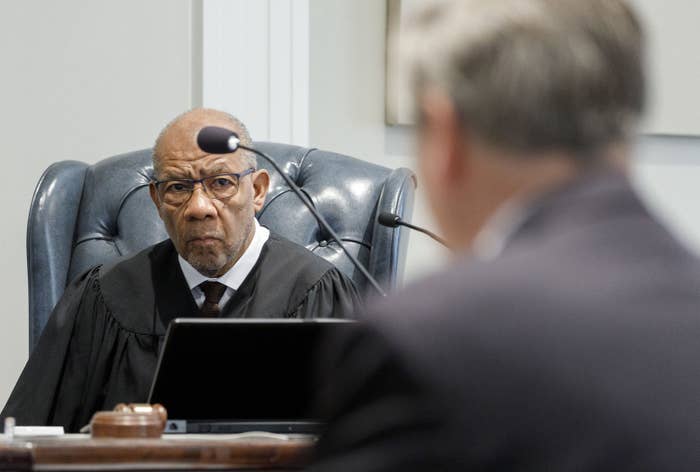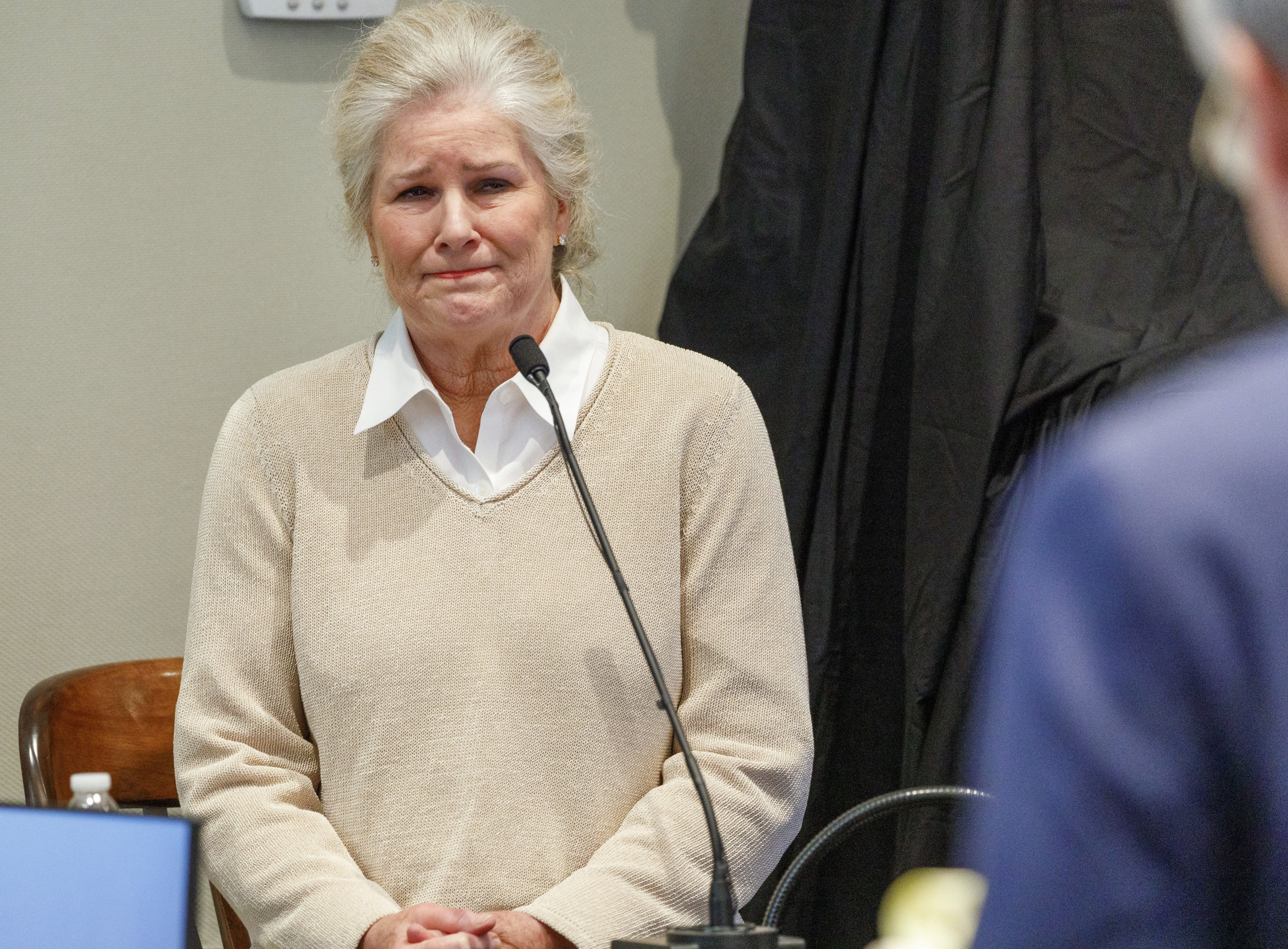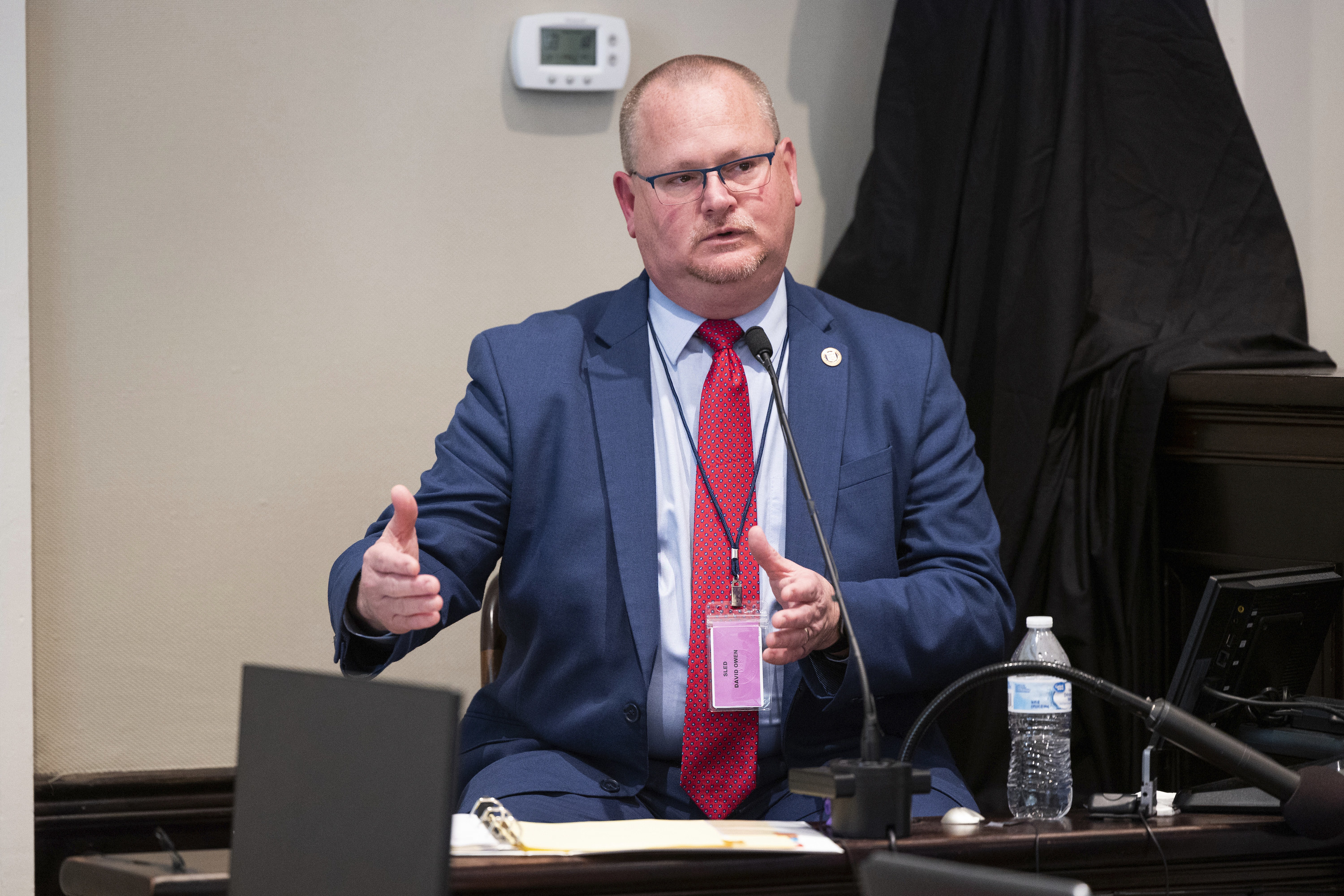
Alex Murdaugh’s murder trial took a 180-degree turn on Wednesday afternoon after the South Carolina judge reversed a ruling he had made just a few hours earlier regarding the admissibility of evidence related to the defendant’s alleged botched suicide plot.
Shortly after beginning proceedings at the Colleton County Courthouse on Wednesday, Judge Clifton Newman initially announced he would prohibit jurors from hearing evidence about Alex’s alleged botched attempt to hire a contract killer, Curtis “Eddie” Smith, to fatally shoot him by the side of an isolated rural road months after his wife, Maggie, and son Paul were fatally shot.
The morning’s ruling had been a rare win for the defense team after extensive evidence about a string of other alleged financial crimes was allowed to be admitted in order to prove a motive for murder. Here, though, Newman said that he believed that allowing evidence of the roadside shooting would instead mainly go to casting Alex’s character as violent. As such, the judge said, it would go against a state rule of criminal procedure that excludes unfairly prejudicial evidence.
“I believe that to allow this evidence in is a bridge too far,” Newman said.
However, the judge warned he was only granting the motion to exclude the evidence for now, noting that previous questions from Alex’s defense team to witnesses under cross-examination have opened the door to new lanes of evidence being admitted.
“Of course, as we have seen, things change,” Newman said.
Well, change things did.
By Wednesday afternoon, the judge said he was reversing his earlier order to exclude the evidence following questions from Alex’s defense team to the lead state investigator, which Newman determined had “opened the door” for the jury to hear about the roadside incident.

Defense attorney Jim Griffin had asked David Owen, an agent with the South Carolina Law Enforcement Division (SLED), whether he learned during the investigation that Alex, a now-disbarred attorney, had been paying as much as $50,000 per week to Smith, a distant cousin and former client, for drugs. Smith had, in turn, allegedly been procuring the drugs from a local gang and now owed them money.
“Did you ever conduct a cellphone analysis of these drug gang members to see where they were on the night of June 7?” Griffin asked Owen.
The SLED agent replied that he did not have their phone numbers, but that agents did check electronic records for any phones identified near the crime scene and that they only identified those of first responders.
Griffin also asked Owen whether any DNA evidence was taken from these drug gang members to check whether it matched evidence found under Maggie’s fingernails. Owen said they did not.
Following those questions, Newman said he would now permit witnesses to be called about the roadside incident in order for the jury to have a fuller picture of the relationship between Smith and Alex.

It was the second time in as many days that the 12 jurors heard hints about the roadside incident but were not provided with extensive evidence about it.
In testimony on Tuesday, Marian Proctor, Maggie’s sister, told jurors that she had been fearful after Maggie and Paul, were fatally shot in June 2021 because she believed they might have been murdered in retribution for a fatal boat crash that Paul allegedly caused two years prior. But Proctor said she found it strange that Alex did not appear to be afraid that he would be targeted next.
Two months after Maggie and Paul were killed, Proctor said she was horrified to learn that Alex, too, had been shot. She feared the family was being picked off one by one. “I had just lost two of the family members and I felt like they were being targeted at that point,” Proctor told the jury.
But Alex was only slightly injured in the roadside shooting and Proctor said that when she learned he’d been fired from his law firm the previous day for stealing vast sums of money, her perception of things changed.
“What specifically changed your perception of the roadside shooting after your initial concern?” lead prosecutor Creighton Waters asked her.
“The story that was initially told about what happened [by Alex] came to not be true,” she responded.
However, Proctor’s testimony ended at that point, and she was not allowed to expand on the false story Alex had told first responders about being shot by an unknown assailant as he changed a car tire. She also did not say that both Alex and Smith were subsequently charged over the scheme, which was allegedly intended to ensure Alex’s surviving son, Buster, would receive an insurance payout.
In arguing that evidence about the roadside shooting should be permitted, Waters told the judge in a hearing on Wednesday morning without the jury present that it was relevant to their suggestion that Alex had killed his wife and son — ostensibly aware that people would suspect the murders would be linked to the boat crash — in order to divert attention from his financial misdeeds that were close to being discovered. There was a “symmetry” between the two events, Waters argued.
“The side of the road [shooting] happens and everyone's rushing to Alex Murdaugh’s aid again,” Waters said. “The fact that he had just been exposed for embezzlement is quickly forgotten about and of course, everybody's assuming, Oh my gosh, it must be the real bad guys, when in fact, it was him all along.”
Conversely, in his arguments on Wednesday morning, defense attorney Dick Harpootlian said prosecutors were trying to use the roadside shooting evidence as a “distraction” to tarnish Alex’s character and not to prove a motive.
Alex had not intended to survive the scheme, Harpootlian said, and only lived because the bullet flew 1 millimeter too far to the left. As a suicide plot, it thus differed greatly from the prosecution’s suggestion that Alex comes up with violent schemes in order to divert attention from himself, Harpootlian said.
“Once he realizes he’s still alive, he tells that story, but obviously he didn’t intend to be alive,” Harpootlian said. “In other words, there’s not a scheme that was concocted at any point. If it’s a scheme, it was concocted after he realized he wasn’t dead.”
But once Griffin asked Owen about Smith on Wednesday afternoon, prosecutor John Meadors seized the chance to ask the SLED agent about how Alex only mentioned Smith and the drug gang as possible suspects in the murders of his wife and son after the roadside incident.
“Did he mention anybody else who could’ve done this, who could’ve been involved in it, who could’ve killed ‘my wife and my son’ from June 7, 2021, until September of ’21? Did he ever mention anybody else?” Meadors asked Owen, banging his first on a table and yelling for emphasis.
“No, he did not,” Owen replied.

Prior to their questions to Owen about Smith, Alex’s defense team had worked to poke holes in the SLED team’s collection of evidence, noting, for example, that they took months to search Alex’s parents' home and had never asked him for clothes he was seen wearing in a Snapchat video Paul had filmed earlier that night.
Owen also admitted that he presented evidence to a local grand jury he later found out to be untrue regarding supposed blood spatter on a shirt Alex had been wearing. A test Owen was later informed of showed there was no human blood on the shirt.
After roughly three weeks of testimony, prosecutors have signaled they intend to try to wrap up their case by Thursday, at which time defense attorneys may begin to call their own witnesses.
It’s not yet clear if Alex himself will take the stand.
UPDATE
This post has been updated with the judge reversing his motion.
